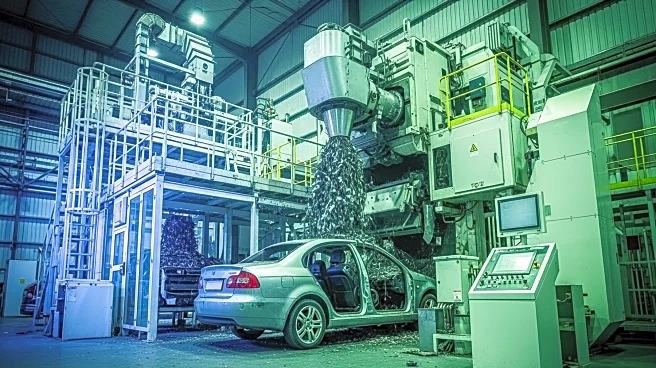What's Happening?
A new method for recycling metal from scrap cars has been developed, potentially eliminating millions of tonnes of waste annually and reducing carbon emissions associated with producing virgin aluminium. Traditionally, scrap aluminium from cars has been recycled into low-grade cast alloys used in engine blocks for combustion engines. However, as the automotive industry shifts towards electric vehicles, there is no longer a demand for these low-grade alloys, risking the accumulation of unusable scrap metal. Stefan Pogatscher from the University of Leoben in Austria has introduced a process that recycles scrap aluminium into a high-grade alloy suitable for various car components. This method involves melting all scrap aluminium from a car, including a wide range of alloys and impurities, into a brittle material. Reheating this material transforms it into a stronger, more moldable alloy, potentially rivaling primary-made wrought alloys.
Why It's Important?
The development of this recycling process is significant as it addresses the environmental challenges posed by the transition to electric vehicles. By providing a solution for the surplus of scrap aluminium, it reduces the need for producing virgin aluminium, which is energy-intensive and contributes to carbon emissions. This innovation could lead to more sustainable manufacturing practices in the automotive industry, benefiting both the environment and the economy. The ability to recycle scrap metal into high-grade alloys could also lower production costs and promote the use of recycled materials, aligning with global efforts towards a circular economy.
What's Next?
The next steps involve scaling the recycling process for industrial use and gaining acceptance from the manufacturing sector, which is traditionally conservative. The research team is in discussions with industry partners to develop the process further. Challenges remain in ensuring the new alloy meets stringent automotive standards and in managing the variability of scrap metal compositions. Continued research and collaboration with industry stakeholders will be crucial to overcoming these hurdles and implementing the process on a larger scale.
Beyond the Headlines
This development could have broader implications for the recycling industry, potentially influencing policies and practices related to waste management and resource conservation. It highlights the importance of innovation in addressing environmental issues and the role of academia-industry partnerships in driving sustainable solutions. The success of this process could inspire similar advancements in other sectors, contributing to a more sustainable future.









